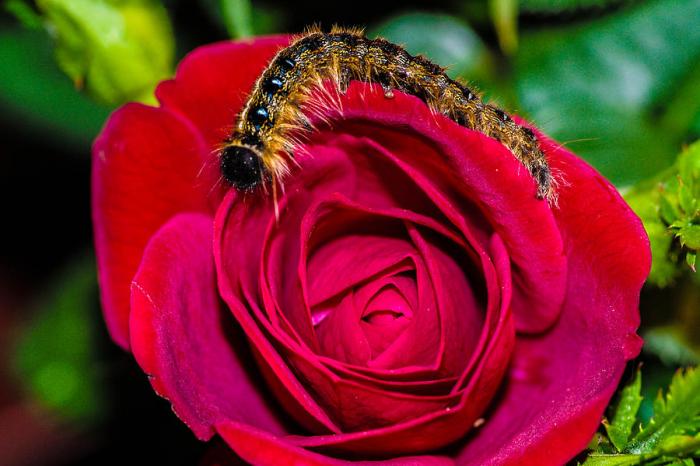Caterpillars on roses can be a troublesome issue for gardeners. These larvae, which transform into moths or butterflies, can cause significant damage to rose plants by munching on their leaves and flowers. While chemical pesticides are commonly used, there are effective natural methods to address this problem. This article will explore how to get rid of caterpillars on roses naturally.
Understanding the Problem
Caterpillars feed on the foliage of rose plants, leaving unsightly holes and potentially weakening the plant. Their feeding habits can lead to reduced plant vigor and aesthetic damage. Identifying the specific type of caterpillar can help in choosing the most effective natural control methods. Common caterpillars that attack roses include the rose caterpillar and the tomato hornworm.
Natural Methods to Remove Caterpillars
1. Handpicking
One of the simplest and most direct methods to manage caterpillars is handpicking.
Inspect your rose plants regularly for visible caterpillars. Check both the upper and lower sides of leaves, as caterpillars can hide in these areas.
Gently remove the caterpillars by hand and drop them into a container of soapy water to dispose of them. Wearing gloves can make this process more comfortable.
Handpicking is effective for small infestations and can prevent the problem from escalating.
2. Neem Oil
Neem oil is a natural insecticide derived from the seeds of the neem tree. It acts as a deterrent for various pests, including caterpillars.
To use neem oil:
Mix neem oil with water according to the instructions on the product label.
Spray the mixture onto the affected rose plants, ensuring coverage of both the tops and bottoms of leaves.
Apply neem oil in the early morning or late afternoon to avoid direct sunlight, which can reduce its effectiveness.
Neem oil works by disrupting the life cycle of caterpillars and can help reduce their population over time.
3. Bacillus thuringiensis (Bt)
Bacillus thuringiensis is a naturally occurring bacterium that targets caterpillars. It produces toxins that are harmful to caterpillars but safe for humans and beneficial insects.
To use Bt:
Purchase a Bt product specifically labeled for caterpillar control.
Follow the application instructions provided with the product.
Spray Bt on the affected plants, covering the foliage thoroughly.
Bt is effective when caterpillars ingest it, as it disrupts their digestive system. Multiple applications may be necessary for severe infestations.
4. Garlic and Hot Pepper Spray
Garlic and hot pepper sprays can act as natural repellents for caterpillars. Both ingredients have strong odors and tastes that deter these pests.
To make a garlic and hot pepper spray:
Blend several cloves of garlic with a small amount of water.
Strain the mixture and combine the garlic water with a tablespoon of hot pepper flakes and a quart of water.
Add a few drops of dish soap to help the mixture adhere to the leaves.
Spray the mixture on the affected rose plants, focusing on the undersides of leaves.
Apply this spray every few days or after rain. The strong scent and taste of garlic and pepper can help repel caterpillars from your roses.
5. Diatomaceous Earth
Diatomaceous earth is a natural powder made from fossilized algae. It works by physically damaging the exoskeletons of insects, including caterpillars, causing them to dehydrate and die.
To use diatomaceous earth:
Sprinkle the powder evenly on the soil around your rose plants and on the foliage.
Reapply after rain or watering, as moisture can reduce its effectiveness.
Diatomaceous earth is safe for humans and pets but should be used carefully to avoid inhaling the dust.
6. Beneficial Insects
Introducing beneficial insects to your garden can help control caterpillar populations naturally. Several insects are natural predators of caterpillars and can help keep their numbers in check.
Ladybugs: These insects feed on various pests, including aphids and caterpillars. Releasing ladybugs in your garden can help control caterpillar populations.
Lacewings: Lacewing larvae are voracious predators of caterpillars and other small insects. They can be purchased and released into your garden to help manage pests.
Parasitic Wasps: Certain species of parasitic wasps lay their eggs on caterpillars. The developing larvae feed on the caterpillar, eventually killing it. Parasitic wasps can be purchased and introduced to your garden.
7. Companion Planting
Companion planting involves growing plants that repel pests or attract beneficial insects. Certain plants can help deter caterpillars or attract predators that will help control their numbers.
Marigolds: Marigolds are known to repel various pests, including caterpillars. Planting them near roses can provide some level of protection.
Nasturtiums: Nasturtiums can act as trap crops, attracting caterpillars away from your roses. They can also attract beneficial insects that prey on caterpillars.
8. Cultural Practices
Proper garden maintenance and cultural practices can help prevent caterpillar infestations and promote healthy rose plants.
Regular Pruning: Pruning rose plants can remove infested leaves and improve air circulation. This can make it more difficult for caterpillars to find suitable feeding sites.
Maintaining Plant Health: Healthy plants are better able to withstand pest damage. Ensure your roses receive adequate water, nutrients, and sunlight to maintain their vigor.
Cleaning Up Debris: Remove fallen leaves and plant debris from around your roses. This can help reduce the habitat for caterpillars and other pests.
See also: How to Prevent Garden Pests: A Florist’s Guide
Conclusion
Managing caterpillars on roses naturally involves a combination of methods that can effectively control these pests without resorting to chemical pesticides. Handpicking, neem oil, Bacillus thuringiensis, garlic and hot pepper spray, diatomaceous earth, beneficial insects, companion planting, and cultural practices all play a role in maintaining healthy rose plants.
By employing these natural methods, you can protect your roses from caterpillar damage while minimizing environmental impact. Regular monitoring and timely intervention are key to keeping caterpillar populations under control and ensuring the continued beauty and health of your rose garden.


